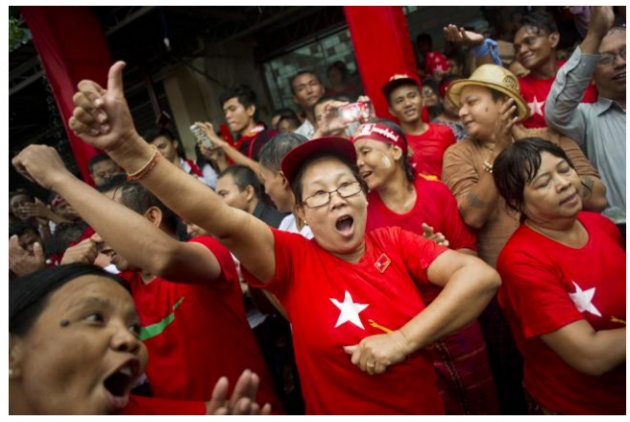
Supporters of Aung San Suu Kyi’s pro-democracy party on Monday cheered early results from Myanmar’s historic election, with hopes boosted of sweeping gains to carry it to power after decades of military dominance.
Election authorities have so far announced only a small fraction of the results, but the National League for Democracy has scooped the lion’s share of those seats, boosting enthusiasm in the crowds in front of party headquarters in Yangon.
“We’ll win tonight, we’ll stay until we win anyway,” said 24-year-old Wanna Htay, sporting a scarlet bandana with the party’s iconic fighting peacock motif as the crowd sung and cheered around him at the height of the celebrations.
Hours later, the White House hailed what it called a “historic” election, but urged parties to wait for the final vote tally before declaring victory or making assessments about fairness.
Sunday’s elections saw millions line up to cast their ballots in what many hope will mark a dramatic leap towards democracy in the Southeast Asian nation, which withered for decades under the iron grip of junta rule.
It could take days for the full results to be officially announced, but the NLD has already given a bullish prediction for its first election in 25 years.
Party spokesman Win Htein told AFP that unofficial tallies showed the opposition “on track to win more than 70 percent of seats around the country”.
He did not specify if the percentage would translate into power under Myanmar’s complex political system.
- Suu Kyi cautious -
The NLD, which currently accounts for a tiny proportion of parliament’s MPs following landmark 2012 by-elections, is shooting for 67 percent of elected seats in the national legislature to be able to select a president and form a government.
That would be enough to overwhelm the ruling Union Solidarity and Development Party and their military allies—who automatically get 25 percent of seats under a constitution scripted to ensure they still have a major stake in the future.
The USDP has already said it was ready for a wipeout in the commercial capital Yangon, while several of its heavyweights—including its chairman—lost their seats.
Suu Kyi, who is barred from the presidency under the army-drafted constitution, on Monday gave a cautious hint at victory in her first comments since the polls.
“It is not the time to congratulate our candidates who we think have won the election,” she told supporters and journalists from the balcony of her party’s Yangon headquarters.
But “people have an idea of the result even if I don’t say it,” she added.
Election authorities have said that preliminary figures would be released within 48 hours of Sunday’s vote, and a full nationwide count could take 10 days or more.
Assistant US Secretary of State Daniel Russel called the election “a hell of a step forward” for democracy on Monday, but echoed the caution of the White House, whose spokesman said it was “too early” to call the result or explore how it might affect international ties.
- Change afoot? -
The NLD has so far won 49 lower house seats—including 24 in Yangon and 10 in the country’s second city Mandalay, both areas where the party is expected to sweep the vote.
The USDP, appearing increasingly beleaguered, has taken just three lower house seats so far.
Another two lower house seats have gone to ethnic parties in eastern Shan and northern Kachin states, according to the tally officially released so far.
Early NLD victories also included a win for Naing Ngan Linn, contesting for the Yangon regional parliament, who was injured in a dramatic sword attack while out canvassing on October 29 in Tharketa township on the city’s fringes.
Meanwhile USDP heavyweight Shwe Mann conceded on his Facebook page that he had lost his seat to his NLD challenger, and party chairman Htay Oo told local media that he had also failed to keep his seat in Hinthada, a few hours from Yangon.
Some local media called on President Thein Sein to concede without delay.
The junta nominally gave up power in 2011, and the country has since spun through rapid change, with the quasi-civilian USDP government launching reforms that brought an end to most international sanctions.
Election officials estimated an 80 percent turnout, a figure observers say will aid the NLD’s quest for a majority. Among the 30 million registered for Sunday’s election, many were first-time voters.
President Thein Sein and the still-powerful army chief have both vowed to respect the outcome of the election—even if the USDP loses its choke-hold on power.



